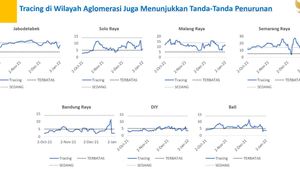JAKARTA - WHO continues to collect various information on the spread of Omicron variants around the world. And the result is good news. This variant does not cause severe symptoms like the Delta variant.
There is a lot of evidence to suggest that the Omicron variant coronavirus affects the upper respiratory tract, causing milder symptoms than the previous variant.
"We are finding more studies showing that Omicron infects the upper body. It is different from others, which can cause severe pneumonia", said WHO Incident Manager, Abdi Mahamud.
And said Abdi Mahamud, that fact could be "good news".
However, he added the high Omicron transmission meant the variant could become dominant within weeks in many places. This can pose a threat to countries where the majority of the population remains vaccinated.
His statement about a reduced risk of severe disease supports other data that includes a study in South Africa, which was one of the first countries to report the emergence of Omicron.
However, Mahamud also gave one caveat, calling South Africa a "different situation" due to its young population among other factors.
Asked about whether a special Omicron vaccine was needed, Mahamud said it was too early to say, but stressed that the decision required global coordination and should not be left to the commercial sector to decide for themselves.
SEE ALSO:
The English, Chinese, Japanese, Arabic, and French versions are automatically generated by the AI. So there may still be inaccuracies in translating, please always see Indonesian as our main language. (system supported by DigitalSiber.id)

















